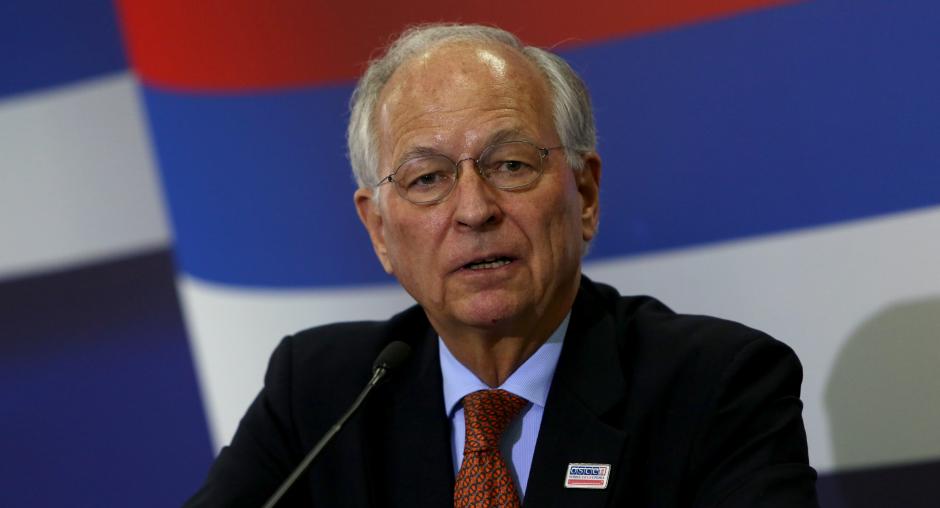Robust diplomatic process needed to replace mutual recrimination with rebuilding trust in Europe, conclude Panel of Eminent Persons

BELGRADE, 3 December 2015 - A diplomatic process that explores the common problems of European States carefully, confidentially and systematically is needed to overcome the current divisions and uncertainties over security, concludes the final report of the Panel of Eminent Persons on European Security as a Common Project, presented today on the margins of the 22nd OSCE Ministerial Council in Belgrade.
The Report, “Back to Diplomacy”, is the outcome of a year-long review by the Panel exploring the prospects for renewed dialogue, taking account of the damage done by the crisis in and around Ukraine, and how to re-launch the idea of co-operative security.
“We propose a return to diplomacy. We need a robust diplomatic process, which is designed to replace mutual recrimination with rebuilding trust. Without military activity, without propaganda, without rhetoric,” said Ambassador Wolfgang Ischinger, chairperson of the Munich Security Conference (MSC) and chairperson of the Panel, presenting the Report in Belgrade.
The Report highlights the need for more effective measures to reduce the risk of military accidents or incidents; completing the implementation of the Minsk agreements, including the restoration of full control of Ukraine over its border; and the creation of an international Ukraine Contact Group. As soon as the Minsk commitments are in place on the ground, the Panel recommends that the OSCE launch a robust diplomatic process to rebuild the foundation of European security.
“We need confidence re-building in the political field - that is to say, diplomacy,” said Ischinger. “If successful, it should conclude with a summit meeting. The Finnish initiative which led to the Helsinki Final Act forty years ago was a courageous step, and we need such courageous steps again – today more than ever.”
A summit at the level of Head of State or Government should be organized by the OSCE Chairmanship, supported by the OSCE Troika, and in communication with the Ukraine Contact Group, the Report says, and include in its agenda:
- Discussing security arrangements of countries whose security status is disputed and modernizing confidence- and security-building measures in the politico-military dimension;
- Agreeing on a set of procedures to resolve existing protracted conflicts in the OSCE area;
- Establishing a better human dimension implementation review process;
- Examining ways to improve economic connectivity;
- Strengthening engagement with OSCE Partners for Co-operation and with regional organizations in Asia and the Middle East.
This independent Panel was created at last year’s Ministerial Council meeting in Basel by the OSCE 2014 Swiss Chairmanship to look at how to re-consolidate European security as a common project and rebuild trust and confidence. It consists of 15 eminent personalities with long-standing practical expertise in European security in all its dimensions from all OSCE regions. The Panel issued an Interim Report in June this year on lessons learnt for OSCE from its engagement in Ukraine.
Following the release of its final Report, the Panel will continue its outreach activities into 2016 in line with its mandate, promoting the Report and its recommendations.
The members of the Panel are:
Wolfgang Ischinger (Germany): Chairman of the Munich Security Conference, Chairperson primus inter pares of the Panel;
Dora Bakoyannis (Greece): Member of Greek Parliament, Former Minister of Foreign Affairs and the OSCE Chairperson-in-Office (2009);
Tahsin Burcuoğlu (Turkey): Former Ambassador;
Ivo H. Daalder (United States of America): President of the Chicago Council on Global Affairs, Former Ambassador;
Oleksandr Chalyi (Ukraine): Former First Deputy Minister for Foreign Affairs, President of Grant Thornton;
Vaira Vike-Freiberga (Latvia): Former President, President of the Club de Madrid;
Jean-Marie Guéhenno (France): President of International Crisis Group, Former UN Under-Secretary-General;
Barbara Haering (Switzerland): Director of econcept Inc., Former Member of Parliament;
Sergi Kapanadze (Georgia): Director of Georgia’s Reforms Associates, Former Deputy Foreign Minister;
Sergey A. Karaganov (Russia): Honorary Chairman of the Presidium of the Council on Foreign and Defense Policy;
Malcolm Rifkind (United Kingdom): A former Member of Parliament, Former Foreign Secretary;
Adam Daniel Rotfeld (Poland): Professor at Warsaw University, Former Foreign Minister;
Teija Tiilikainen (Finland): Director of the Finnish Institute of International Affairs, Former State Secretary;
Kassym-Jomart Tokayev (Kazakhstan): Chairman of the Senate of the Parliament of the Republic of Kazakhstan; Former Minister of Foreign Affairs and Prime Minister of Kazakhstan; Former Under-Secretary-General of the UN and Director-General of the United Nations Office at Geneva;
Ivo Visković (Serbia): Professor at the Faculty of Political Sciences at the University of Belgrade, Former Ambassador.
